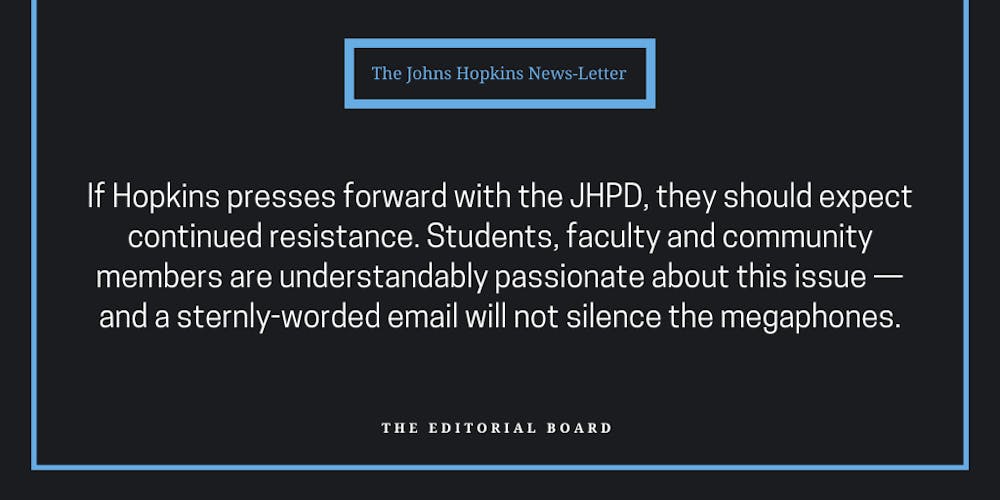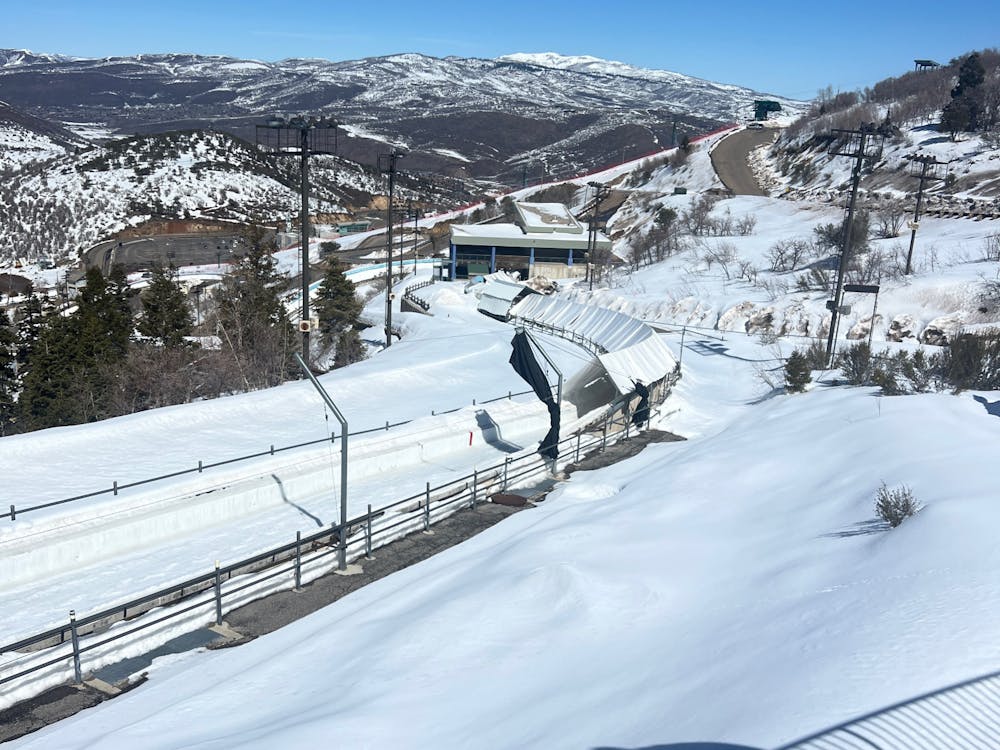In the most recent step toward the implementation of a private police force, Hopkins Public Safety hosted a town hall at Shriver Hall last Thursday. The event was quickly interrupted by protesters, which included Hopkins students and Baltimore community members.
This protest was not the first, and we feel confident that it will not be the last. Accordingly, we believe the contentious history of the Johns Hopkins Police Department (JHPD) bears repeating for newer members of the Hopkins community.
Hopkins first announced its intentions to create a private police force in early 2018. Since then, the administration has continued planning for the JHPD despite community opposition and legislative barriers. In April 2019, a group of students and community members partook in the Garland Sit-In, a month-long protest of the administration’s actions that ultimately led to student arrests.
In the wake of the 2020 Black Lives Matter protests, Hopkins announced a two-year pause in the implementation of the JHPD. The Police Accountability Board, meant to be an avenue for community engagement and feedback, was suspended in September of the same year.
The pause ended this summer as Hopkins affirmed its intent to move forward with the force and released the first draft of its memorandum of understanding (MOU) with the Baltimore Police Department (BPD). Hopkins Public Safety announced a series of town halls intended as an opportunity for community feedback on the MOU.
In response to the protests at the first town hall, Provost Sunil Kumar and Vice Provost Rachelle Hernandez sent out an email titled “Supporting free exchange of ideas at Johns Hopkins” condemning the actions of protesters. In particular, Kumar and Hernandez admonished those who “attempt[ed] to disrupt the meeting by storming the stage, shouting down and taunting invited speakers, interfering with the audio-visual equipment or blaring megaphone siren sounds.”
In the email, the University claimed they want “all voices” to be heard. We can’t help but find this condemnation of the protest to be hypocritical. The administration has repeatedly refused to acknowledge those in opposition to the police force. Members of the Hopkins and Baltimore community have resorted to protest because other expressions of dissent — such as petitions and letters — have been brushed aside. The administration may not find megaphone sirens palatable, but at least they can’t pretend it’s white noise.
While the email from the University insists on a distinction between these “disruptive” protesters and “peaceful” protesters, we assert that both types of protest are valid forms of communication and civic engagement.
We demand transparency from the Accountability Board. Hopkins says the board will allow community members to shape the development and operation of the JHPD, but how? We want to know who the board members are talking to, how they’re engaging the community and what feedback they’re collecting.
Shortly after Hopkins decided on the two-year pause, an Accountability Board member announced his resignation in The News-Letter, citing the board’s failure to act on its express purpose. He called on the remaining board members to either disband or commit to action. Two years later, what has changed?
We’re also concerned about the JHPD’s recruitment and hiring practices. The current draft of the MOU states that, while the JHPD will not directly solicit sworn BPD officers for employment, they can hire up to five per year. Additionally, this cap doesn’t apply to officers who have not been employed by the BPD in the past six months.
Baltimore City is notorious for its corrupt police and their bloated budget. Eight former BPD officers who made up the Gun Trace Task Force were convicted of a slew of crimes, including racketeering and armed robbery. Baltimore journalists Baynard Woods and Brandon Soderberg, who wrote a book on the police squad, said the culture of the BPD “allowed and in some ways incentivized their behavior.”
We do not want this type of culture to be brought to the JHPD. How will the Accountability Board ensure our university’s police department is different?
Given the fraught relationship between police and Baltimore residents, protesters’ worries are more than valid. It’s frustrating to see Hopkins pay lip service to the “free exchange of ideas” while not taking community concerns seriously.
If Hopkins presses forward with the JHPD, they should expect continued resistance. Students, faculty and community members are understandably passionate about this issue — and a sternly-worded email will not silence the megaphones.





